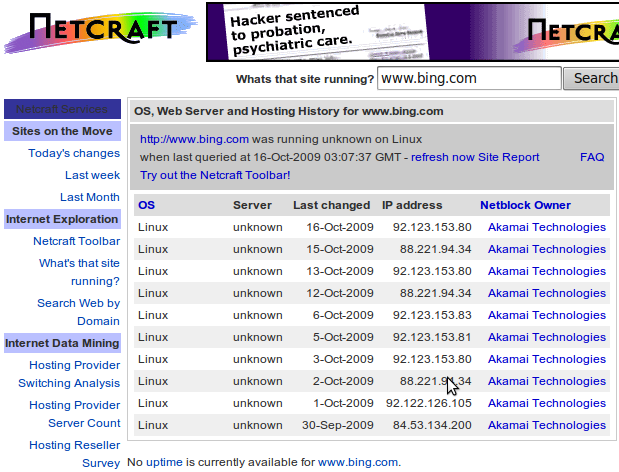This is exactly how all their customers out there feel about NVIDIA and their support for the wonderful Linux destop.
Tag: Linux
The winner of this years April Fools Day is IBM
Did you notice… April Fool’s Day has passed by.
As usual, jokes were ranging from buttard-lame to über-fluffy-rainbow-unicorn mighty.
A lot from Google’s jokes this year were great, but they’re all expected and bringing no surprise at all.
I think the one below was the most funny one from them.
My all-round favorite from 2012 goes out to the IBM Linux kerel developers.
They announced a new patch that would rock your socks off…
From this patch on, Linux would no longer need a CPU.
To be honest… for a second I went: What? Crazy… but then it did hit me… in the face!
Read all about it in this article at Phronix
[FSF]: Stand up for your freedom to install free software
When done correctly, “Secure Boot” is designed to protect against malware by preventing computers from loading unauthorized binary programs when booting. In practice, this means that computers implementing it won’t boot unauthorized operating systems — including initially authorized systems that have been modified without being re-approved.
The biggest issue with the “Secure Boot” system, is that it’ll create a vendor-lockin. This has been seen with the android system as well, but it’ll be Microsft pulling the strings on this one.
Some other interesting reads on Secure Boot:
Changing date and/or time on Linux
Here’s a short and easy way to set your system and hardware clock from the command line.
Open your terminal and follow these steps.
First check the current time of your hardwareclock:
hwclock -r
Then add the right date/time to your systemclock.
In the example provided you’ll find some strange long number.
You have to read it like this (from left to right):
[01] = month (Jan) | [14] = day | [0231] = time (02:31) | [2011] = year
sudo date 011402312011
Now sync your hardware clock with the date/time you’ve just set:
sudo hwclock --systohc
Check if the hardware clock is synced right:
sudo hwclock -r
Profit!
Microsoft’s Bing.com is running on Linux servers
Ok, Windows Server 2003 was great, and Windows Server 2008 is even greater, as told by Microsoft @ the It-pro days in Ghent (Belgium) 2 years ago.
So, we’re going flat on the assumption that they’re using their own ‘great’ server technology for their own good.
After all, according to their website, Windows Server is cheaper, safer and better than any other technology around.
But wait, what’s this?

As a search page should be quick, secure and efficient I agree you should use Linux, but I never saw this one coming!
Other searches for microsoft results in different linux hosted services beneath the microsoft.com domain.
wb.dlservice.microsoft.com
search.microsoft.com
vista.gallery.microsoft.com
social.microsoft.com
fullproduct.download.microsoft.com
silverlight.dlservice.microsoft.com (This one is even hosted on Ubuntu)
I know the saying: “Keep your friends close, but your enemy’s closer” (not sure who came up with this slogan), but this is way too funny!
Are Linux users more Cat people than Windows users?
While browsing the internet for the past years, I’ve encountered quite a lot of websites around cats.
Some are even single service sites, such as icanhascheezburger,lolcats, etc…
So cats are, according to me, more popular than any other animal within the internet community. Even if google disagrees.
Continue reading Are Linux users more Cat people than Windows users?
LFS 6.5 Released
 The new LFS 6.5 is released.
The new LFS 6.5 is released.
Although I never tried it, it’s intriguing me (a lot).
Not just because it’s a geeky thing to do, but because it’s the best way to understand how linux works.
To erase all confusion here,LFS is not a distribution, it’s a guide.
A 314 pages (and counting) book written by Gerard Beekmans.
I tried a number of distributions and could not decide on any one. They were great systems in their own right. It
wasn’t a matter of right and wrong anymore. It had become a matter of personal taste. With all that choice available,
it became apparent that there would not be a single system that would be perfect for me. So I set out to create my
own Linux system that would fully conform to my personal preferences.
To truly make it my own system, I resolved to compile everything from source code instead of using pre-compiled binary packages.
Whenever I have some spare time…
But for now, I’m quite happy with my Ubuntu.
The problem of starting linux
 I was recently reading a discussion on the release of Windows 7.
I was recently reading a discussion on the release of Windows 7.
The article went into detail when it came to the different versions that will be sold. There will be 7.
In the comment-section, I noted quite a lot of people arguing that this is too much to choose from for home users.
Well then, let’s take those people’s vision and apply it to the world of Linux.
Let’s go on a journey with someone eager to start using Linux (without a live cd).
Let’s say this is one of the wonderfull people informing themselves before they actually start doing something.
Then this user would trigger a search query on his favorite search engine for the value Linux.
Linux.org is probably the first link that will be hit, as the first result has a 42% chance of getting selected.
On Linux.org he/she’ll be learning a little on the principles of linux and the GNU licence.
After a bit of reading, she’ll know how wonderful linux is and appreciate the idea of openness.
As our imaginary person has a simple old spare computer that can be used to testdrive linux, he/she is convinced and ready to download her own copy.
But there is the first problem: Which linux distribution?
Google Trends on popular Linux distributions
Well, to be honest with you, the idea for article is a straight rip-off from Jeff Waugh’s blog.
But I guess we can go a little further in analyzing this chart. Continue reading Google Trends on popular Linux distributions
How many times did you pay for an unused OS?
When you buy a computer from a know merchant, it comes with a pre-loaded OS (mostly Microsoft’s Windows).
And yes, you pay for it. But “‘what if” you don’t use it? Is it possible to buy a OS-free system? Continue reading How many times did you pay for an unused OS?
